- Home
- Claire North
The Pursuit of William Abbey Page 13
The Pursuit of William Abbey Read online
Page 13
Anxiety and terror are no use to my government. Mrs Parr berated me into standing up straight and pulling myself together. The baron told me to put a stiff upper lip on, and think of Britain – and both of them, of course, meant it. They always meant it; that was why they were my companions.
And Langa came, and I spoke the truth, and turned my face towards the light, and in this manner we trudged round the world, outrunning my shadow a few days at a time, looking for a cure that no one else wanted me to find.
For Margot’s sake, I had already lied to the Nineteen; but it was around this time, soaked in blood and chased by shadow, that I finally resolved to betray absolutely my friends, my masters and my country.
Chapter 30
There was, the doctor said, a moment when I realised I was a traitor. It took me a while to reach this conclusion, but being reached, the revelation was unavoidable. It was the very nature of my condition that brought about the certainty, for here was I, a man who every day in every way defined myself as good, just and upright, doing my best for my fellow men, and who was useful in my work only by the spirit of the African boy who had been lynched by the very system that I swore to serve. Even in death, I remained a tyrant, a cowardly, frightened butcher of Langa’s soul, transforming his life into nothing more than a tool to be used and discarded by powerful men.
How to reconcile the truth of my heart with the truth of all that I did?
How to serve and yet be redeemed?
It was, I concluded, simply impossible. To serve the Empire that killed the child was to kill him again. Our Empire made its peoples nothing more than puppets and shadows to the white man’s story; and here I was doing the same. That was the truth of it, to this very day.
Margot gave me the means to turn against my masters, when we found each other again. But it was in India where Saira who showed me the truth of myself and sealed my fate.
Chapter 31
In the small mountain kingdom of Vaniyali, hugging the lower hills of the Himalayas, a queen and her sons were plotting treason.
This was 1891, and technically she was well within her rights to do so. She was within her rights to set her own taxes, to command her own armies, to protect her people from the exploitation of the plantation owners and rich white men come to profit off her lands. She was rani, after all. The British was merely there to… advise. Advice was so much cheaper than the gun.
Usually, such flutters of independent will from one of the hundreds of rajas still ostensibly in charge of their Indian domains were bought off by the British with pretty diamonds and florid titles; with scholarships to Oxford for the children of the great and a six-gun salute whenever the raja was summoned – no, not summoned – humbly invited by the British government to attend in Delhi, should it be convenient. When those failed, another raja or rani with some distant claim to ownership over the land could usually be found to stage a quiet internal coup, supported by redcoats only too happy to see that right was done, and that the taxes flowed to London from a more willing puppet.
Not so with Rani Darabai, for in her ambition she had done something unforgivable: she had been seen talking with the Russians.
“Terrible place, India!” concluded the baron. “And if the Russians ever do stick their finger in, well!”
Well, what a war it would be, he mused, and if he were a younger man, oh yes indeed, he might even be game for a bit of the old swash and bother, setting things right with one big brouhaha, that’s how to do it, what.
Talking to the Russians meant that no mercy would be shown when the British came. The Great Game could not permit St Petersburg to put a finger in India. But first, the government had a question they needed asked…
“Does she believe that the Russians will aid any rebellion, or possess knowledge of any Russian plans to invade?”
This was why I had been sent halfway round the world, to know the truth of this moment, a thing so important that only a truth-speaker would do. In the palace of the Rani of Vaniyali, incense burnt beneath portraits of spaniels purchased from a dealer in London. Candles in bowls of water spluttered in the corners to drive back the shadows. A phonograph was silent on top of a pile of books, and mounds of cushions had been stacked by past occupants who had spilled their bodies this way and that across the cold stone floor. A monkey sat on the balcony, nibbling its way through an apricot, its vanilla face framed with peanut hair. And behind a folded four-panel divider of carved wood that had been set by the rani’s chair, I thought I saw a swish of red as a foot was withdrawn, and thought I felt something more besides, but couldn’t be sure.
“Dr Abbey – does she believe that the Russians will invade?”
The man asking the question was one Major Mudeford, a man promoted entirely for his skill in discrete, unrecorded destruction meted out against those foolish enough not to be grateful for the British and their ways. He did not believe in witchery, but trusted his commanders absolutely. If they said I knew the truth of things, why then, that was absolute. I knew what my answer would mean, and hung my head and replied:
“No. She tried to convince them, but knows they won’t. They can’t make it past Kabul; everyone who tries dies. She’s bluffing.” An intake of breath; a tightening of muscles in fingers and chest. Rani Darabai was twenty years younger than her ancient, ailing husband. He had seen the Indian Mutiny, and gone from being a great king to a man who merely nodded and smiled and waved at the latest laws of the British. She would see her sons rule in greatness again, and one stood to her left, a fine player of polo, able to recite from beginning to end a bowdlerised Hamlet in which everyone lived happily ever after. Through the open balcony doors, a paradise on earth rolled up into the mountains, streams of crystal water and purple metals thick and wide as my hand, courtyards of carved stone where once the ancient gods had been worshipped and named, and where now tennis courts had been carved for the latest fashion, the newest way. I had expected a woman bristling with gold, adorned with every mark of status, pins in her hair and chains around her fingers, wrists and arms. Instead, the lady of the kingdom wore a pale green sari and leather thong sandals and carried a fan of white lace. Her skin was a paler almond than her son’s, and her long hair was pulled back so tightly from her forehead that her eyebrows rose in permanent surprise from the strain, and as she looked at me I thought I heard another woman whisper from behind the wooden divider, and the shadows moved strangely upon the floor and it seemed to me…
Then she looked me in the eye and snapped, “Are you willing to trust one man’s word on this? Will you risk war across India?”
Mudeford hesitated. If it was he making the decisions, he absolutely would not. But then, he had been in Afghanistan during the disastrous, bloody invasion of the British, and had primarily learned that few forces would be as effective at keeping Russia from India than the men of the Hindu Kush. That truth made this process somewhat more academic for him, but he had a job to do and so asked the second question for which I had been sent halfway round the world. “Will other rajas rise if she does, and who are they?”
I looked into the truth of the Rani’s heart, and in that moment condemned her kingdom to burn. “None will rise,” I replied. “She went to them and told them that the people of their lands were suffering, that they lived in chains, and the rajas replied that be that as it may, they personally were doing very well out of the British thank you, and would mind her not to trouble her little lady’s head.”
Whisper, whisper, whisper – a figure moving to her side, a face unseen, and I have a feeling that I know something of who hides there, that I hear the beating of a stranger’s heart, catch a taste of their truth on my tongue, and it is…
“She hopes that when your soldiers attack, and she knows they will,” I sighed, “the tales of atrocity she spreads will spark a second mutiny.”
“I see,” mused Mudeford. “How keen. What a pity that the telegram that could spark this rebellion will be sent by British equipment on British cables b
y British men. Not even history will remember this, because real history, ma’am, is written in English. We are not unreasonable people. It is Her Majesty’s Government’s sincere wish to maintain cordial relationships with all her… fellow kings. Yet your actions have demonstrated a shocking disrespect for the civilised way of things…”
Whisper whisper whisper from behind the wooden wall, and the rani’s eyes are on me, though Mudeford is speaking, and it occurs to me that she knows the truth of my heart as surely as I know hers, and sees the shape of my shadow, however far behind he may be.
“And so,” Mudeford rattled on, “to make reparations as quick and as effective as possible, and to ensure that there are no more misunderstandings of this sort again, we are proposing a strengthening of the British mission, including the provision of a military attaché…”
The rani rose. Her oldest son caught her arm, as if to steady her, but she brushed it off in an instant, and finally now turned her attention on Mudeford. “Sir,” she proclaimed, “two hundred years before the Romans invaded Britain, Asoka was proclaiming the laws of his empire in stone across the entire continent of India, founding libraries and temples that still stand today. When Hadrian built his wall, the Gupta empire was making astronomical and medical discoveries that you would not see in your lands for over a thousand years. The British have no genius for conquest. Your weapon is greed, fatting a few powerful pigs for the slaughter. But, sir, you have misunderstood our character if you think we will dine on British beef alone.”
A hand shot out from behind the wooden divider. It was a woman’s hand, the colour of cinnamon, unadorned with bangles or rings. It caught the rani by the wrist, and she froze as if spiked with curare. The monkey on the balcony bounded away. Her son stood rooted to the spot, straight as a spire, face locked tighter than the Bank of England.
I stared at that hand, and in the moment of certainty knew the truth of its owner’s heart. Perhaps she already knew mine. I wondered if I could apologise, if there was anything I could possibly say that would make my role anything other than filthy.
Slowly the rani sank back into her seat, and the hand let go.
Mudeford looked round the room, like a new buyer considering a fresh lick of paint. “You should not have talked with the Russians, ma’am,” he said at last. “You shouldn’t have tried to play games with powers bigger than yourself.”
She stared at nothing, and it was only because she did not know herself what she would do that I missed it, until a moment too late.
“Mudeford!” I called out, and a woman’s voice also called out, words I didn’t understand from behind the divide, but the rani grabbed her son’s ceremonial sword from the sheath at his hip, rose to her feet without a word and was charging across the room. I fell over backwards, legs up and stool down as I tumbled out of her way, but she had no interest in me, and caught Mudeford as he was half turning away. The blade split the soft flesh of his abdomen on a slanting angle through his intestines, liver and out the other side. She let go of the handle, but the blade stayed in, sliding down under its own weight. There wasn’t yet much blood, but as Mudeford dropped and I scrambled back, ready to beg for mercy with all the garbled sincerity I could muster, the rani fell to her knees, hands over her eyes.
Everything over.
Everything gone.
That is the truth of her heart.
And how much worse that truth is when you know you have tried to do what is right, and ended up the villain of your own story.
Mudeford fell, and it was a very awkward falling, the angle of the sword sticking through his back making it impossible to land gracefully, his own weight just adding to the slow driving of the blade through his flesh.
The rani, if she had it in her to kill again, seemed to have no interest in me. Her son was already grabbing her, pulling her to her feet, snapping, “Mother, come!” – a man with a plan. He would grab all the gold he could carry, dress in suit and tie, and run away. The moment the Russian had come to the palace gates, sparking rebellion in his mother’s eyes, he’d been preparing for this, and his only regret was that he’d stood by and let it happen. He thought about having me killed, calling for the guards as had been his mother’s plan, but it all seemed very pointless now, and I was a no one, a drop of blood in the ocean that must be spilt. In that moment there was, I suppose, a kind of mercy in him, as he dragged his mother away.
I knelt by Mudeford’s side, and he knew was going to die. I didn’t particularly like the man – he was too pleased with his own truth, with the rightness of the butchery he commanded – but then I could have asked him any question, any secret of his heart, and all I would know was the absolute certainty of his death. He had been raised a Christian, and until the exact moment he’d been run through had believed completely in a heaven, and that he was destined for it. The second steel parted skin, that belief had parted too, torn open and bleeding. He had never doubted; never questioned. Death changed all that.
I pulled the sword free in a puckered kiss of flesh, rolled him onto his side, pressed fine silken pillows to the wound at his front and back, tied them off with tears of curtain fabric ripped from the wall, thought of calling for help, wondered who’d answer, kept my mouth shut. Mudeford was lucky, in a way. The rani’s blade had sliced the abdominal aorta. He bled to death in six minutes. I stayed with him, kneeling in a pool of crimson cushions. He didn’t say anything profound. He didn’t have any messages for his family. Everything up to that point seemed much less important, now that he looked back on it. If it hadn’t hurt, he might have laughed.
Instead, he died.
I felt for a pulse, and there wasn’t one.
I looked into his eyes, which did not move, listened for his breath. I laid his head back down, and turned to the one person left in the room.
The other truth-speaker.
She had emerged from behind the partition screen, and stood and watched in silence, as immersed perhaps in the truth of Mudeford’s death as I had been. She wore a red sari with frayed hem and no adornment. Her head was shaved to a thin black shadow across an uneven scalp. Her hands were dry and closed one on top of the other above her stomach, as if digesting a bad meal. Her eyes were close to the thin bridge of her nose, the colour of roast cumin. Her chin was tiny beneath a long, drawn mouth; there were pinpoint scars in the lobes of her ears from jewellery, which she had not worn for a very long time. She was half a foot shorter than me, with square wrists sunk to hungry bones and a scar above her left elbow where her mother-in-law had tried to kill her the day her husband died, and her name was Saira, and the truth was that she had never seen so much blood before in her life, no, not even when the mob came to drive her from her home, and she was astonished that it affected her so little.
And the truth of her heart was that she had not known a man could walk with the shadow at her back, and such a notion was heresy, and yet here was the reality of it before her eyes, as inescapable as night.
And the truth of her heart was that she had thought the white men were going to kill her, and had in a single moment come to terms with that fact, and now looking at me didn’t quite know what to think.
She watched me with busy, soul-tearing interest as I rose, blood soaked into my skin and clothes, and knew the truth of my heart as surely as I knew the truth of hers.
And she was a truth-speaker, who walked alone down a dusty road; and she was blessed and cursed as I was.
For a moment, we balanced, she and I, with blood spreading between us, and read the secrets of each other’s hearts.
Then, without a word, she held out her hand.
I took it.
Together we ran.
Chapter 32
Saira led me from the palace by the quiet ways that only the servants and unwashed ones knew as Vaniyali burnt. It did not do to let a truth-speaker like herself be too much seen. People said they brought bad luck.
When the redcoats came, their main interest was in destroying the palace. Des
troy the palace, destroy the history, change the story of everything that happened. Pillaging was of secondary concern, and in no one’s particular interest. But as word spread of the changing of the guard, eager neighbours quickly rushed to inform on he who had whispered sedition, or she who had been in league with the rani, or he who had behaved suspiciously, or of the wealthy neighbour who was caught looking in a most peculiar way at a sedan chair. By midday, neither British soldiers nor local residents were asking permission to act on their instincts, but rather were happy to investigate the private quarters and locked boxes of every man who had ever said something rude about their personal hygiene, or looked funny at their wife.
Within hours, queues of local dignitaries were besieging the British consulate, ready to reiterate their loyalty in exchange for protection for their and their brother’s homes; or to name a long-time rival as a likely loyalist to the rani and her court. The old raja had been freshly enthroned on a pile of cushions at the back of the consulate, guarded for his protection and fed on iced tea, seemingly perfectly content with the distant sounds of screaming and tearing-up of floors as the soldiers went to work.

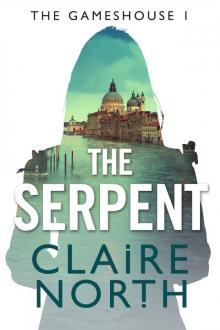 Gamehouse 01 - The Serpent
Gamehouse 01 - The Serpent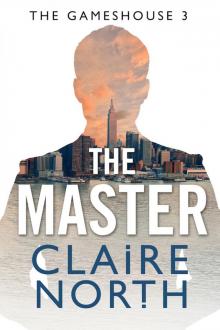 The Master
The Master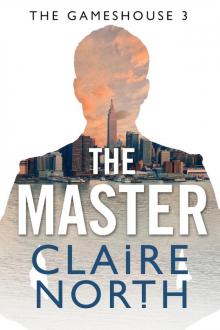 Gamehouse 03 - The Master
Gamehouse 03 - The Master The Thief
The Thief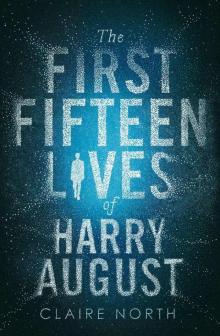 The First Fifteen Lives of Harry August
The First Fifteen Lives of Harry August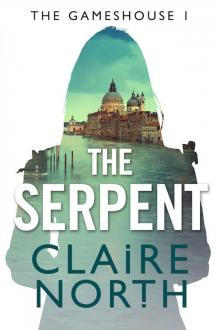 The Serpent
The Serpent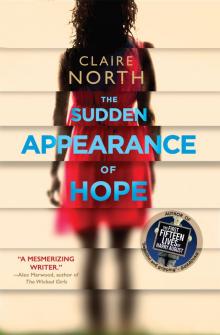 The Sudden Appearance of Hope
The Sudden Appearance of Hope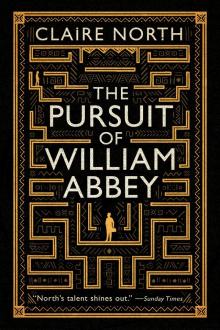 The Pursuit of William Abbey
The Pursuit of William Abbey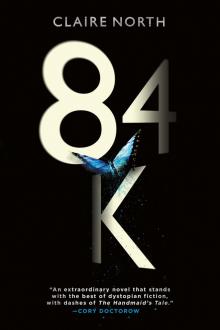 84k
84k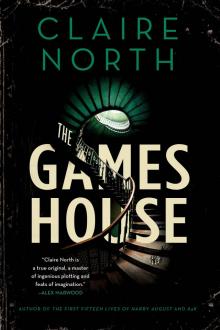 The Gameshouse
The Gameshouse Touch
Touch Sweet Harmony
Sweet Harmony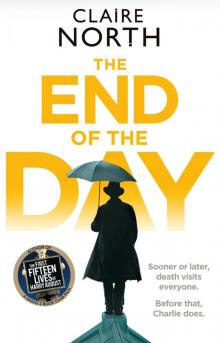 The End of the Day
The End of the Day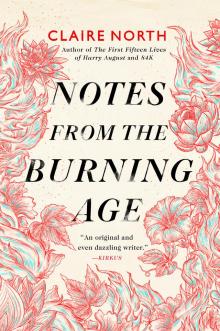 Notes from the Burning Age
Notes from the Burning Age